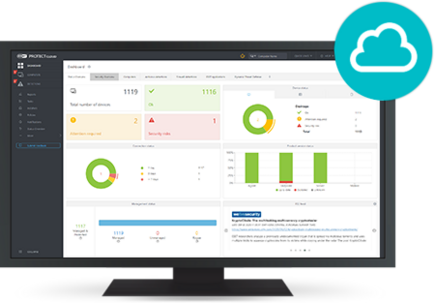Console
ESET PROTECT Console
Ensures real-time visibility for all endpoints as well as full reporting and security management for all OSes
- Cloud-based console with the possibility of an on-premises deployment
- Provides real-time visibility of all endpoints: desktops, servers, virtual machines and even managed mobile devices
- Enables full reporting for ESET security solutions
- Controls endpoint prevention, detection & response layers across all platforms
- Connect anytime, anywhere from your favorite web browser
Explore features
Completely multitenant
Multiple users and permission groups can be created to allow access to a limited portion of the ESET PROTECT console. This allows full streamlining of responsibilities across large enterprise teams.
Automation framework
Dynamic groups can sort computers based on current device status or defined inclusion criteria.
Dynamic and custom reporting
ESET PROTECT provides over 170 built-in reports and allows you to create custom reports from over 1000 data points.
Fully automated VDI support
A comprehensive hardware detection algorithm is used to determine the identity of the machine based on its hardware. This allows automated re-imaging and cloning of non-persistent hardware environments. Therefore, ESET’s VDI support requires no manual interaction and is fully automated.
Advanced RBAC
Starting with MFA-protected access, the console is equipped with an advanced Role-Based Access Control (RBAC) system.
Support for XDR
To further improve situational awareness and provide visibility across your network, ESET PROTECT works together with ESET Inspect, the XDR-enabling component of the ESET PROTECT platform.
Start within minutes
With a cloud console, time to protection is significantly shorter. No longer burning resources waiting for components to install, or even scheduling the installation on a server in the first place. Just open your account with ESET and add all the endpoints to be protected—it is as simple as that.
Fast troubleshooting
On the cloud console, ESET experts will be able to provide more effective support or troubleshooting if necessary—which is given by the simple fact that there will be no time wasted finding out what version you’re currently on, because you’re always on the latest one.
Always the latest features
Leave the updating of the console up to us. We’ll do it in the background, and you’ll always be on the latest version with the latest components. That way your organization will benefit from the latest features, and the admins can enjoy the most recent user experience improvements straight from our roadmap.
Lower total cost of ownership
When deciding whether to move from on-prem security console, cloud may seem expensive first. But think again—you’ll no longer need to maintain a server, and spend time with regular upgrades, patches, or restarts. Let alone server licences and backups; which makes cloud console a better deal within a short time span.
Proven and trusted over 30 years
ESET has been in the security industry for over 30 years, and we continue to evolve our technology to stay one step ahead of the newest threats. This has led us to be trusted by over 110 million users worldwide. Our technology is constantly scrutinized and validated by third-party testers who show how effective our approach is at stopping the latest threats.
MSP ready
If you’re a Managed Service Provider (MSP) taking care of your clients’ networks, you’ll appreciate the full multi-tenancy capabilities of ESET PROTECT. MSP licences are automatically detected and synced with the licensing server, and the console lets you do advanced actions such as install/remove any 3rd party application, run scripts, remote commands, list running processes, HW configurations, etc.
System requirements
Cloud deployment
- Internet connection
Supported browsers
- Mozilla Firefox
- Microsoft Edge
- Google Chrome
- Safari
- Opera
On-premises deployment
Supported operating systems
- Windows Server 2012, 2012 R2, 2016, 2019, 2022
- Windows Storage Server 2012 R2, 2016
- Microsoft SBS 2011
- Ubuntu, RHEL Server, CentOS, SLED, SLES, OpenSUSE, Debian
